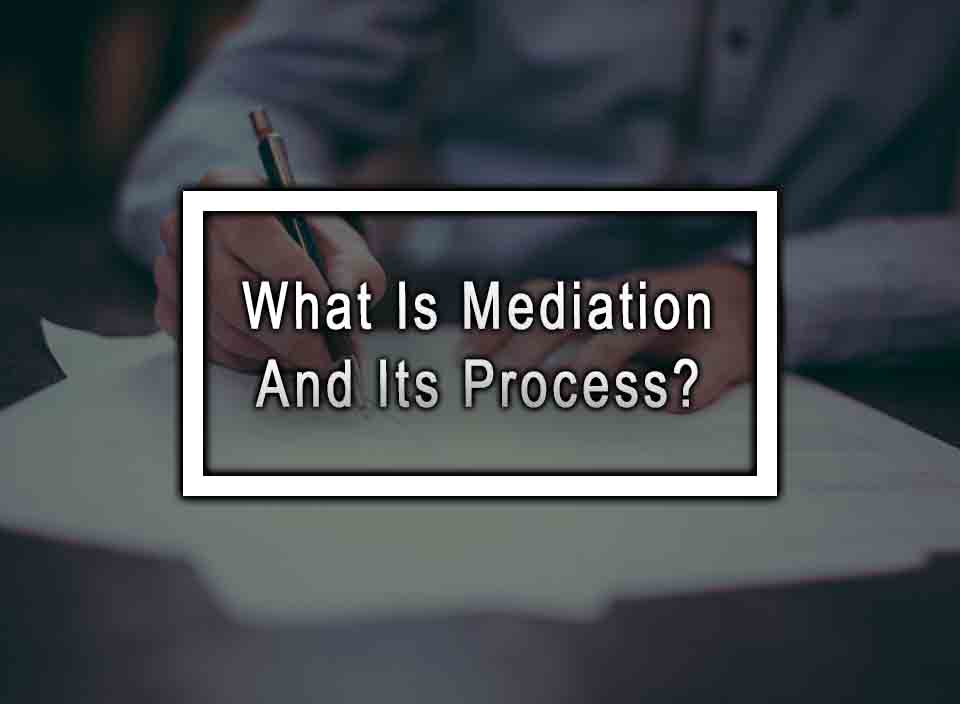What Is Mediation And Its Process? – Mediation is an alternative form of dispute resolution that has become increasingly popular over the years. Unlike traditional litigation that involves going to court, mediation allows parties to resolve their disputes outside the courtroom setting with the help of a neutral third party – the mediator. This process is less formal, less time-consuming, and less expensive than traditional litigation. But what is mediation, and how does it work? In this article, we will explore the concept of mediation and its process.
Table of Contents
ToggleWhat Is Mediation?
Mediation is a process where a neutral third party, the mediator, tries to facilitate discussions and negotiations between two or more parties who are involved in a dispute. The mediator helps the parties work together to reach a resolution that is mutually acceptable to all parties.
What is mediation? – Mediation is typically used in civil cases, such as family law, employment, commercial and corporate disputes, personal injury, and real estate disputes. The process allows parties to find common ground, understand each other’s perspectives, and work together to create a solution that meets the needs of each party.
Mediation Process
What is mediation and its process? – The mediation process typically follows a few basic steps:
Preparation
The initial stage of the mediation process involves the parties and the mediator preparing for the mediation session. The mediator will typically make contact with each party to understand the nature of the dispute and individual expectations. This helps the mediator prepare for the mediation session, ensuring a comfortable and constructive dialogue for all parties involved.
Opening Statements
The mediation process typically begins with all parties coming together in a neutral setting. The mediator will then give an introduction and make opening statements that set the tone for the session. The mediator will also describe the mediation process and ask the parties to share their perspectives on the dispute.
Joint Discussion
After the opening statements, the parties will engage in a joint discussion. The mediator will facilitate the discussion, and each party will have the opportunity to express their views and feelings concerning the dispute. The mediator will encourage the parties to actively listen and learn from each other’s viewpoints.
Private Caucus
During mediation, the mediator may hold private caucuses with each party, allowing them to share information confidentially. Private caucuses can help the mediator identify significant points of contention and work with both parties to develop proposals to overcome them.
Negotiation and Resolution
Once all parties have had the opportunity to express their views, and the mediator has gained a comprehensive understanding of the dispute, negotiation toward a resolution begins. The mediator will assist the parties in negotiating an agreement that meets the needs of everyone. The parties can explore various options that can help in resolving their case.
Agreement
When a resolution is reached, the mediator will help the parties write up an agreement. They will review the agreement thoroughly with the parties before signing the agreement. If the signing of the agreement marks the end of the dispute mediation process, this indicates that both parties have reached an agreement that is satisfactory to all parties involved. In some cases, the parties may choose not to sign an agreement, which may lead them back to the negotiation stage.
Conclusion
What is mediation and its process? – Mediation can be a beneficial alternative to traditional dispute resolution methods as it assists parties in achieving a mutually satisfactory agreement. Mediation is becoming increasingly popular as the process is less formal, less time-consuming, less expensive, and more private than litigation. Through the process, the mediator ensures that the parties involved in the dispute achieve a positive outcome, leaving both parties satisfied by the end of the mediation process. By understanding the mediation process, individuals can learn more about the process, and the benefits, and identify the alternative dispute resolution method that is suitable for them. It’s essential to remember that the outcome is a critical factor in deciding the best dispute resolution method to utilize.
Mediation FAQ
Here are the most common questions about what is mediation.
What issues can be mediated?
Almost any type of conflict or dispute can be mediated, including but not limited to divorce and family matters, personal injury disputes, workplace conflicts, business disputes, property disputes, and contractual disagreements.
What are the benefits of mediation?
Mediation provides several benefits, including the opportunity for parties to control the outcome of the dispute, avoid costly and time-consuming litigation, maintain confidentiality and privacy, preserve relationships, and improve communication and trust between parties.
Is mediation legally binding?
The agreement reached in mediation can be legally binding if the parties agree to make it so and sign a written agreement. However, a mediated agreement is not enforceable by a court until it is made part of an official court order.
How long does mediation take?
The length of mediation depends on the complexity of the issues and the willingness of the parties to negotiate and reach an agreement. Mediation can typically be completed within a few hours to several sessions over a few weeks or months.
What happens if mediation fails?
If mediation fails, parties may choose to pursue other options, such as arbitration or litigation. However, even if the parties do not reach a settlement during mediation, the process can still be beneficial in helping them better understand the issues and each other’s perspectives, which may help with future negotiations or court proceedings.
More like this: Amlodipine Side Effects












